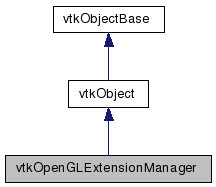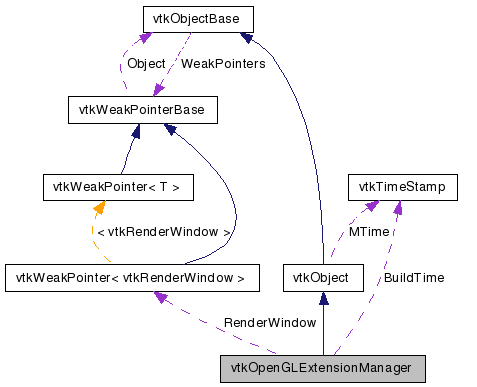vtkOpenGLExtensionManager Class Reference
#include <vtkOpenGLExtensionManager.h>


Detailed Description
Interface class for querying and using OpenGL extensions.vtkOpenGLExtensionManager acts as an interface to OpenGL extensions. It provides methods to query OpenGL extensions on the current or a given render window and to load extension function pointers. Currently does not support GLU extensions since the GLU library is not linked to VTK.
Before using vtkOpenGLExtensionManager, an OpenGL context must be created. This is generally done with a vtkRenderWindow. Note that simply creating the vtkRenderWindow is not sufficient. Usually you have to call Render before the actual OpenGL context is created. You can specify the RenderWindow with the SetRenderWindow method.
vtkOpenGLExtensionManager *extensions = vtkOpenGLExtensionManager::New(); extensions->SetRenderWindow(renwin);
Generally speaking, when using OpenGL extensions, you will need an vtkOpenGLExtensionManager and the prototypes defined in vtkgl.h.
#include "vtkOpenGLExtensionManager.h" #include "vtkgl.h"
To use an OpenGL extension, you first need to make an instance of vtkOpenGLExtensionManager and give it a vtkRenderWindow. You can then query the vtkOpenGLExtensionManager to see if the extension is supported with the ExtensionSupported method. Valid names for extensions are given in the OpenGL extension registry at http://www.opengl.org/registry/ . You can also grep vtkgl.h (which will be in the binary build directory if VTK is not installed) for appropriate names. There are also special extensions GL_VERSION_X_X (where X_X is replaced with a major and minor version, respectively) which contain all the constants and functions for OpenGL versions for which the gl.h header file is of an older version than the driver.
if ( !extensions->ExtensionSupported("GL_VERSION_1_2") || !extensions->ExtensionSupported("GL_ARB_multitexture") ) { { vtkErrorMacro("Required extensions not supported!"); }
Once you have verified that the extensions you want exist, before you use them you have to load them with the LoadExtension method.
extensions->LoadExtension("GL_VERSION_1_2"); extensions->LoadExtension("GL_ARB_multitexture");
Alternatively, you can use the LoadSupportedExtension method, which checks whether the requested extension is supported and, if so, loads it. The LoadSupportedExtension method will not raise any errors or warnings if it fails, so it is important for callers to pay attention to the return value.
if ( extensions->LoadSupportedExtension("GL_VERSION_1_2") && extensions->LoadSupportedExtension("GL_ARB_multitexture") ) { { vtkgl::ActiveTexture(vtkgl::TEXTURE0_ARB); } else { vtkErrorMacro("Required extensions could not be loaded!"); }
Once you have queried and loaded all of the extensions you need, you can delete the vtkOpenGLExtensionManager. To use a constant of an extension, simply replace the "GL_" prefix with "vtkgl::". Likewise, replace the "gl" prefix of functions with "vtkgl::". In rare cases, an extension will add a type. In this case, add vtkgl:: to the type (i.e. vtkgl::GLchar).
extensions->Delete(); ... vtkgl::ActiveTexture(vtkgl::TEXTURE0_ARB);
For wgl extensions, replace the "WGL_" and "wgl" prefixes with "vtkwgl::". For glX extensions, replace the "GLX_" and "glX" prefixes with "vtkglX::".
Definition at line 145 of file vtkOpenGLExtensionManager.h.
| virtual void | LoadAsARBExtension (const char *name) |
| vtkOpenGLExtensionManager () | |
| virtual | ~vtkOpenGLExtensionManager () |
Public Types | |
| typedef vtkObject | Superclass |
Public Member Functions | |
| virtual const char * | GetClassName () |
| virtual int | IsA (const char *type) |
| void | PrintSelf (ostream &os, vtkIndent indent) |
| virtual void | Update () |
| virtual int | ExtensionSupported (const char *name) |
| virtual void | LoadExtension (const char *name) |
| virtual int | LoadSupportedExtension (const char *name) |
| virtual void | LoadCorePromotedExtension (const char *name) |
| vtkRenderWindow * | GetRenderWindow () |
| virtual void | SetRenderWindow (vtkRenderWindow *renwin) |
| virtual char * | GetExtensionsString () |
| virtual vtkOpenGLExtensionManagerFunctionPointer | GetProcAddress (const char *fname) |
Static Public Member Functions | |
| static int | IsTypeOf (const char *type) |
| static vtkOpenGLExtensionManager * | SafeDownCast (vtkObject *o) |
| static vtkOpenGLExtensionManager * | New () |
Protected Member Functions | |
| virtual void | ReadOpenGLExtensions () |
| virtual int | SafeLoadExtension (const char *name) |
Protected Attributes | |
| int | OwnRenderWindow |
| char * | ExtensionsString |
| vtkTimeStamp | BuildTime |
Member Typedef Documentation
Constructor & Destructor Documentation
| vtkOpenGLExtensionManager::vtkOpenGLExtensionManager | ( | ) | [protected] |
Similar to LoadCorePromotedExtension(). It loads an EXT extension into the pointers of its ARB equivalent.
| virtual vtkOpenGLExtensionManager::~vtkOpenGLExtensionManager | ( | ) | [protected, virtual] |
Similar to LoadCorePromotedExtension(). It loads an EXT extension into the pointers of its ARB equivalent.
Member Function Documentation
| virtual const char* vtkOpenGLExtensionManager::GetClassName | ( | ) | [virtual] |
Reimplemented from vtkObject.
| static int vtkOpenGLExtensionManager::IsTypeOf | ( | const char * | name | ) | [static] |
Return 1 if this class type is the same type of (or a subclass of) the named class. Returns 0 otherwise. This method works in combination with vtkTypeMacro found in vtkSetGet.h.
Reimplemented from vtkObject.
| virtual int vtkOpenGLExtensionManager::IsA | ( | const char * | name | ) | [virtual] |
Return 1 if this class is the same type of (or a subclass of) the named class. Returns 0 otherwise. This method works in combination with vtkTypeMacro found in vtkSetGet.h.
Reimplemented from vtkObject.
| static vtkOpenGLExtensionManager* vtkOpenGLExtensionManager::SafeDownCast | ( | vtkObject * | o | ) | [static] |
Reimplemented from vtkObject.
| static vtkOpenGLExtensionManager* vtkOpenGLExtensionManager::New | ( | ) | [static] |
Create an object with Debug turned off, modified time initialized to zero, and reference counting on.
Reimplemented from vtkObject.
| void vtkOpenGLExtensionManager::PrintSelf | ( | ostream & | os, | |
| vtkIndent | indent | |||
| ) | [virtual] |
| vtkRenderWindow* vtkOpenGLExtensionManager::GetRenderWindow | ( | ) |
Set/Get the render window to query extensions on. If set to null, justs queries the current render window.
| virtual void vtkOpenGLExtensionManager::SetRenderWindow | ( | vtkRenderWindow * | renwin | ) | [virtual] |
Set/Get the render window to query extensions on. If set to null, justs queries the current render window.
| virtual void vtkOpenGLExtensionManager::Update | ( | ) | [virtual] |
Updates the extensions string.
| virtual char* vtkOpenGLExtensionManager::GetExtensionsString | ( | ) | [virtual] |
Returns a string listing all available extensions. Call Update first to validate this string.
| virtual int vtkOpenGLExtensionManager::ExtensionSupported | ( | const char * | name | ) | [virtual] |
Returns true if the extension is supported, false otherwise.
| virtual vtkOpenGLExtensionManagerFunctionPointer vtkOpenGLExtensionManager::GetProcAddress | ( | const char * | fname | ) | [virtual] |
Returns a function pointer to the OpenGL extension function with the given name. Returns NULL if the function could not be retrieved.
| virtual void vtkOpenGLExtensionManager::LoadExtension | ( | const char * | name | ) | [virtual] |
Loads all the functions associated with the given extension into the appropriate static members of vtkgl. This method emits a warning if the requested extension is not supported. It emits an error if the extension does not load successfully.
| virtual int vtkOpenGLExtensionManager::LoadSupportedExtension | ( | const char * | name | ) | [virtual] |
Returns true if the extension is supported and loaded successfully, false otherwise. This method will "fail silently/gracefully" if the extension is not supported or does not load properly. It emits neither warnings nor errors. It is up to the caller to determine if the extension loaded properly by paying attention to the return value.
| virtual void vtkOpenGLExtensionManager::LoadCorePromotedExtension | ( | const char * | name | ) | [virtual] |
Loads all the functions associated with the given core-promoted extension into the appropriate static members of vtkgl associated with the OpenGL version that promoted the extension as a core feature. This method emits a warning if the requested extension is not supported. It emits an error if the extension does not load successfully. For instance, extension GL_ARB_multitexture was promoted as a core feature into OpenGL 1.3. An implementation that uses this feature has to (IN THIS ORDER), check if OpenGL 1.3 is supported with ExtensionSupported("GL_VERSION_1_3"), if true, load the extension with LoadExtension("GL_VERSION_1_3"). If false, test for the extension with ExtensionSupported("GL_ARB_multitexture"),if true load the extension with this method LoadCorePromotedExtension("GL_ARB_multitexture"). If any of those loading stage succeeded, use vtgl::ActiveTexture() in any case, NOT vtgl::ActiveTextureARB(). This method avoids the use of if statements everywhere in implementations using core-promoted extensions. Without this method, the implementation code should look like:
int opengl_1_3=extensions->ExtensionSupported("GL_VERSION_1_3"); if(opengl_1_3) { extensions->LoadExtension("GL_VERSION_1_3"); } else { if(extensions->ExtensionSupported("GL_ARB_multitexture")) { extensions->LoadCorePromotedExtension("GL_ARB_multitexture"); } else { vtkErrorMacro("Required multitexture feature is not supported!"); } } ... if(opengl_1_3) { vtkgl::ActiveTexture(vtkgl::TEXTURE0) } else { vtkgl::ActiveTextureARB(vtkgl::TEXTURE0_ARB) }
int opengl_1_3=extensions->ExtensionSupported("GL_VERSION_1_3"); if(opengl_1_3) { extensions->LoadExtension("GL_VERSION_1_3"); } else { if(extensions->ExtensionSupported("GL_ARB_multitexture")) { extensions->LoadCorePromotedExtension("GL_ARB_multitexture"); } else { vtkErrorMacro("Required multitexture feature is not supported!"); } } ... vtkgl::ActiveTexture(vtkgl::TEXTURE0);
| virtual void vtkOpenGLExtensionManager::LoadAsARBExtension | ( | const char * | name | ) | [virtual] |
Similar to LoadCorePromotedExtension(). It loads an EXT extension into the pointers of its ARB equivalent.
| virtual void vtkOpenGLExtensionManager::ReadOpenGLExtensions | ( | ) | [protected, virtual] |
| virtual int vtkOpenGLExtensionManager::SafeLoadExtension | ( | const char * | name | ) | [protected, virtual] |
Wrap around the generated vtkgl::LoadExtension to deal with OpenGL 1.2 and its optional part GL_ARB_imaging. Also functions like glBlendEquation() or glBlendColor() are optional in OpenGL 1.2 or 1.3 and provided by the GL_ARB_imaging but there are core features in OpenGL 1.4.
Member Data Documentation
int vtkOpenGLExtensionManager::OwnRenderWindow [protected] |
Definition at line 239 of file vtkOpenGLExtensionManager.h.
char* vtkOpenGLExtensionManager::ExtensionsString [protected] |
Definition at line 240 of file vtkOpenGLExtensionManager.h.
vtkTimeStamp vtkOpenGLExtensionManager::BuildTime [protected] |
Definition at line 242 of file vtkOpenGLExtensionManager.h.
The documentation for this class was generated from the following file:
- dox/Rendering/vtkOpenGLExtensionManager.h
 1.5.6
1.5.6